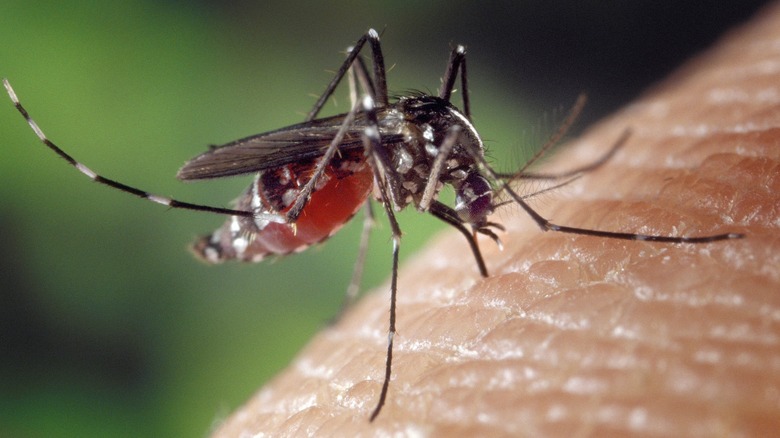The Spice You'll Want On Hand When Camping In Case Of Mosquito Bites
Mankind has had a long and troubled relationship with those itchy little pests: mosquitos. Historians believe that they influenced the outcome of the American Civil War; they were used in biological warfare during World War II, and mosquitos have killed an estimated 52 billion people throughout history.
On a less grand and deadly scale, mosquitos are often the bane of more mundane human activities, such as trying to get a decent night's sleep in the summer. The insects are attracted to CO₂, which may explain why they buzz past your head just as you nod off. Outdoor activities are often blighted by their presence (there is a certain juicy irony that we complain about mosquitos taking a bite out of us while we're sizzling up a nice chunk of another animal's flesh on the barbecue.)
Mosquitos can flourish in cities and rural areas. Still, they are often most noticeable when we leave the comfort of our homes to spend time among the wonders of nature, in fields, forests, and near still bodies of water, which can provide breeding grounds for mosquitos. In other words, we like to pitch our tents right where our species' greatest predator are raising their families.
While disease-carrying mosquitos are on the rise in Europe, bites are generally harmless in the Western world. With this in mind, you might still consider taking some cinnamon on your next camping trip to prevent mosquito bites.
Cinnamon can help ease mosquito bites
Cinnamon has been a prized spice for over 4,000 years of human history. It was once as valuable as gold in ancient Egypt, as mentioned in the Bible. Wars have been fought over it — in the 17th century, Ceylon (now Sri Lanka) produced so much of the spice that it provided a lucrative source of income for the Portuguese Empire, which held the island until the Dutch took over in 1658. While Sri Lanka has since been superseded in tonnage exported internationally, the island remains one of the world's top producers of cinnamon.
Nowadays, cinnamon is a staple of spice racks and store cupboards in powdered or stick form, as well as extracted cinnamon oil. It's an ingredient used in a variety of cakes and pastries and works surprisingly well in some pork recipes (pork and mango pies, anyone?). Cinnamon also comes in handy for treating mosquito bites, especially when combined with honey to make a homemade treatment. Both have natural antibacterial and antifungal properties and offer quick relief for itchy nibbles on your skin.
Another alternative is rubbing raw minced or diced onion on the bite, but cinnamon and honey certainly smell a lot nicer! A third option is slapping a cool slice of cucumber on the affected area to calm the itching and swelling.
Cinnamon also repels mosquitos and other bugs
Thanks to its strong aroma, many online sources recommend using cinnamon or cinnamon oil as a natural repellent for several types of bugs, not just mosquitos. It effectively wards off all kinds of creepy crawlies, from ants and bedbugs to winged pests like wasps and regular houseflies.
As for mosquitos, cinnamon has a strong aroma that keeps the insects away, especially with a mixture sprayed in the air, while cinnamon oil can kill off mosquito eggs before they hatch and spawn more pests. However, in the subreddit r/Damnthatsinteresting, a comment recommending cinnamon to scare off mosquitos and other bugs didn't go over well; not all users were convinced by the power of cinnamon or other homemade preventatives. One Redditor grumbled that since insects couldn't read, they didn't know they were supposed to be repelled by cinnamon or other substances like baking soda, lavender, or vinegar.
In one r/prepper thread, one user recommends cinnamon oil for killing off mosquito larvae. However, they note that since the spice isn't locally sourced, it might be hard to come by in the event of a catastrophe. In any case, cinnamon is readily available to most of us. Hence, it's definitely worth taking some of the spice on your next camping vacation to fight off any unwelcome flying visitors.


